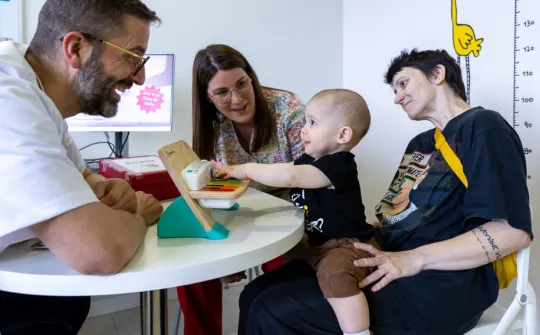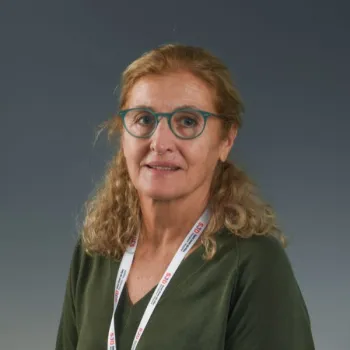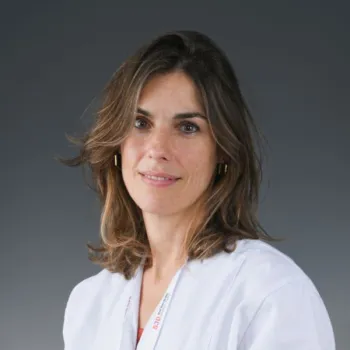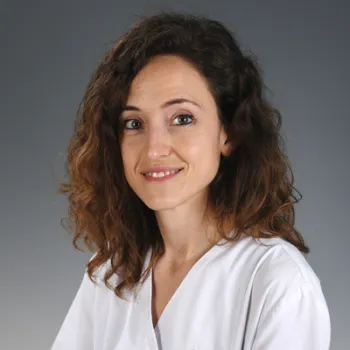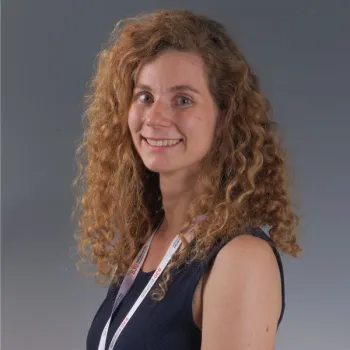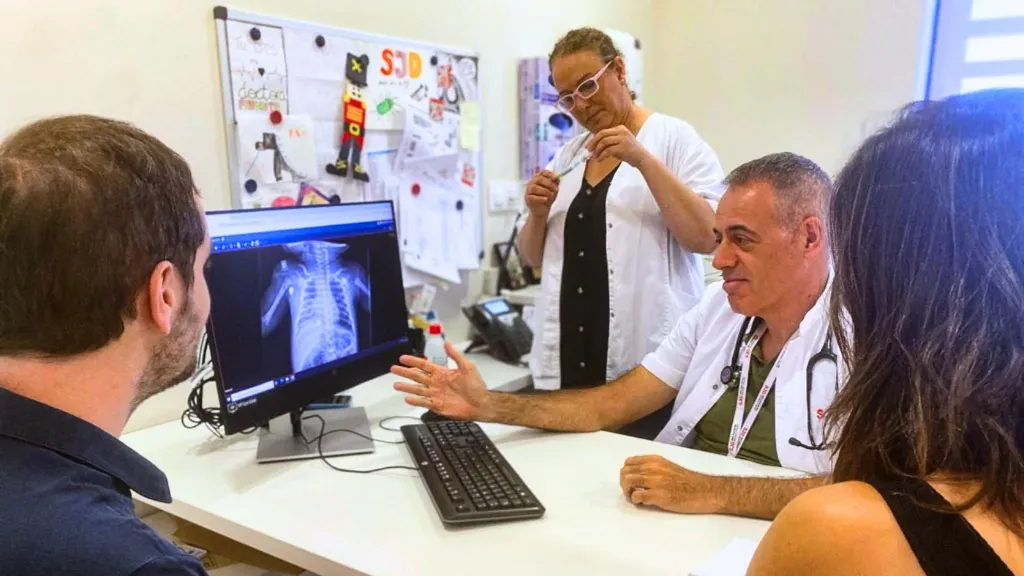
We are a leading centre in the diagnosis and comprehensive treatment of infection diseases in the pediatric population.
The Infectious Diseases Department at the SJD Barcelona Children's Hospital was officially created in 2008, and, since then, it has been the answer to the sociosanitary needs of pediatric patients in an ever-changing healthcare landscape – resulting from the arrival of new pathogens or the higher survival rates of increasingly vulnerable patients.
We regularly review and update protocols so we can face situations head on: tackling opportunistic infections; implementing new microbiological techniques; the rise of antibiotic resistance; or navigating the COVID-19 pandemic.
Accreditations
- We are a CSUR accredited facility in the treatment of imported tropical diseases since 2015.
Leading Infectious Diseases Facility
Our work focuses on the patient and their family.
We are a transversal hospital, meaning we review all of the departments and clinical units at the SJD and create cross-departmental links with the Laboratory, Pharmacy, Anatomical Pathology or Diagnostic imaging. We also boast a specialised outpatient's department covering multiple areas of the field of Infectious Diseases.
In the last few decades, Infectious Diseases has become increasingly relevant. The need for responsible usage of antibiotics and antimicrobials, as well as the growing complexity of the patients we attend at our facility, has led us towards a proactive healthcare model. This model allows us to detect patients at the hospital with active infection or those who are at risk of infection in order to provide early assessment and care.
Our aim is to guarantee equal access to high quality, safe, effective healthcare to people with diseases contracted in countries with endemic infectious diseases. The department monitors epidemic outbreaks across the world, as well as the latest treatments and preventative measures for tropical diseases.
Why the SJD Barcelona Children's Hospital?
Every day, we strive towards providing our patients with comprehensive healthcare, working hand-in-hand with other departments and units at the SJD Barcelona Children’s Hospital in order to make decisions regarding the handling of active infections, at-risk patients or those requiring antimicrobial treatment.
We are constantly adapting and updating our processes due to the increasing relevance of infectious diseases and the rise of antibiotic resistance in the last few decades, as well as the higher complexity of patients we attend at our facility. As such, cooperation with institutions around the world specialising in infectious diseases is vital.
At the forefront of knowledge and healthcare
We are constantly adapting and updating our processes due to the increasing relevance of infectious diseases and the rise of antibiotic resistance in the last few decades, as well as the higher complexity of patients we attend at our facility. As such, cooperation with institutions around the world specialising in infectious diseases is vital.
We play an active role in various international working groups, registries and networks in the field of infectious diseases:
- PENTA
- HITIHE Consortium
- ENPEN
- CIPHER
- cCMVnet
- REDICCMV
- RICET
- pTBnet
- pTBred
- EPPICC
- Zika IPDMA Consortium
- ZIKA-PED network
- GeoSentinel network
- SEIP (various WG)
- HERPnet
- CoRISPE-cat
- NenExp
- VinCAT PROA
- RSV Hospital Network
- AEP Coop. Internacional
- PedGAS network
- RITIP
- RICLIP
- Xagas congènit
- SEMT Chagas
- RIOped
- SCP Nen sense fronteres
- REIV-TOXO
Our figures
first visits to outpatient clinics.
follow-up visits in outpatient clinics.
outpatient treatment administrations.
administration of treatments in Day Hospital.
active clinical trials.
2023 Data
Specialisms and services
This department aims to encourage the exchange of knowledge and cooperation with other hospital departments and units.
We collect and analyse patient samples in order to provide useful information for the diagnosis, treatment and follow-up of each disease.
We focus on patients and their requirements, rather than just on the medicine itself.
We identify structural modifications of organs, tissues and cells to diagnose paediatric diseases and work towards personalised treatments.
We play a key role during the diagnosis, treatment and follow-up of patients.
Furthermore, we specialise in the following areas:
The Antimicrobials Optimisation Programme (PROA) promotes the responsible use of antibiotics and other antimicrobials through non-restrictive strategies.
Optimising antibiotic usage
The Antimicrobials Optimisation Programme (PROA) promotes the responsible use of antibiotics and other antimicrobials through non-restrictive strategies.
The PROA aims to:
- Guarantee the best treatment and clinical results for patients with infectious disease.
- Minimise the side effects from inappropriate antibiotic use, such as the rise and spread of resistance.
- Guarantee a cost-effective use of treatments to ensure a responsible use of resources.
Every day, we work hand-in-hand with staff working in the Pediatric ICU, Neonatal ICU, Hematology, Oncology, Hematopoietic Stem Cell Transplant and Pediatrics to retrospectively audit and review antibiotic prescriptions, making recommendations and, wherever possible, having these discussions face to face with care teams. We monitor antibiotic use and antibiotic resistance, and on a case-by-case basis, we evaluate how diagnostic strategies for infectious diseases can be optimised across different health areas.
Furthermore, we measure and monitor the quality of antibiotic prescriptions given at the hospital: their usage, resistances and surgical prophylaxis; and we also hold information sessions and issue reports to share our findings and data with each respective department or unit. Consequently, we maintain the highest standards possible in antibiotic prescription.
We offer comprehensive, specialised care for pediatric patients exposed to and infected with HIV, as well as pre-teens and teenagers requiring medication after exposure to the virus.
Functional unit for patients with immunodeficiencies
We offer comprehensive, specialised care for pediatric patients exposed to and infected with HIV, as well as pre-teens and teenagers requiring medication after exposure to the virus.
We also offer a dedicated programme for patients transitioning to another adult hospital facility.
Moreover, we monitor and follow-up on patients with primary or secondary immunodeficiencies attended at other hospital departments or units who have an infection.
Patients receiving replacement therapy or who have had a kidney transplant, for example, attend an infectious diseases consultation involving a specialised assessment at the outpatient department, as well as a review of the immunisations they require, their medications and treatments for infections.
We monitor at-risk patients or confirmed cases of vertically transmitted infections (such as HIV, CMV, toxoplasmosis, HSV, VZV, parvovirus, HBV, HCV, HEV, enterovirus, syphilis, rubella, TB, Xagas and Zika) at the outpatient department and at maternity consultations.
We monitor patients with infections that require assessment by a pediatric infectologist, both on an in- and outpatient basis, in hospital and at outpatient departments, respectively.
We have developed a specialised clinic that offers reimmunisation services to patients susceptible to infection.
Immunisations of vulnerable pediatric patients
We have developed a specialised clinic that offers reimmunisation services to patients susceptible to infection.
We have developed a specialised clinic that offers reimmunisation services to patients susceptible to infection (for example: hemato-oncology patients, those with primary and secondary immunodeficiencies, adolescents, etc.) We provide passive prophylaxis for RSV during the October to February season. Furthermore, we carry out vaccination drives and hold clinics and training workshops on COVID and the flu.
We offer consultations with a specialist immunisation nurse.
Immunisation nurse consultation
We offer consultations with a specialist immunisation nurse.
We offer specialist nurse consultations:
- Updating scheduled immunisations.
- Before and after immunosuppressant treatments, solid organ transplants, hematopoietic stem cell transplants.
- Patients from other hospital departments and units: Pediatric Tuberculosis Reference Unit; Sexually Transmitted Diseases Unit; Dermatology; Support for Mistreated Infants; Pulmonology; Nephrology; Rheumatology; ENT (before cochlear implants); Neonatology.
- Systematic immunisation schedule for infants exposed to HIV.
- Updating immunisations for patients from other countries: newly emigrated children, adopted children, travelling children, etc. Each of these groups undergo a post-vaccination marker study.
- Administration of the RSV vaccine for at-risk patients during the virus’ season.
- We run the SARS-CoV-2 and flu vaccination clinics at the outpatient department and the Day Hospital during the winter season.
- We handle staff immunisation before healthcare cooperation visits to Sierra Leone.
We offer diagnosis and treatment for these types of infections, and we also provide information to the adolescent that is suitable for their age and their personal situation. We also provide resources depending on where they live.
Jointly with the Orthopedics and Traumatology Department, we treat pediatric patients with osteoarticular infections that require multidisciplinary management in a single, same-day appointment.
Caring for patients with osteoarticular infections
Jointly with the Orthopedics and Traumatology Department, we treat pediatric patients with osteoarticular infections that require multidisciplinary management in a single, same-day appointment.
In doing so, we optimise cross-departmental coordination so that families can benefit from fewer appointments and shorter waiting times.
We also offer specialist nurse consultations to conduct risk assessments and provide healthcare education for patients and their families regarding how to prevent infection after spine surgery.
We monitor and treat infants arriving from geographical areas with a high prevalence of specific diseases, and offer protection via counselling and immunisation clinics for children who have to travel to countries with endemic diseases.
The department implements strict safety and protection measures for hospital staff and other patients. We are recognised for our work with high-level isolation infections that require a highly prepared team.
High-level isolation infections
We are recognised for our work in the field of high-level isolation infections, which require a well prepared team and adequate health and safety measures, both for centre staff and other patients.
This entails:
- Specific infection protocols and dedicated procedures for their control and prevention.
- Assessment by other departments.
- An auditing and quality assurance programme, as well as a system to report and deal with incidents.
- Ongoing training programmes: using personal protective equipment (PPE) based on a risk analysis and a protocol simulation programme.
The unit sees more than 300 children and teenagers every year who, for various reasons, are at risk of a tuberculosis infection. It treats around 25 cases of tuberculosis and 40 cases of latent infection, making it one of the largest units in Europe.
Pediatric Tuberculosis Reference Unit
The unit sees more than 300 children and teenagers every year who, for various reasons, are at risk of a tuberculosis infection. It treats around 25 cases of tuberculosis and 40 cases of latent infection, making it one of the largest units in Europe.
It is also a reference centre in the study of pediatric and adolescent patients with adenopathies, both from the SJD Barcelona Children's Hospital and those referred from their primary healthcare facility or other healthcare institutions. Care is delivered on an outpatient basis with a Pediatric Infectious Disease specialist and a specialised nurse.
Jointly with a specialist nurse, we monitor patients with suspected or confirmed cases of soft tissue or osteosynthesis-related infections.
Diseases we monitor and/or treat
Team
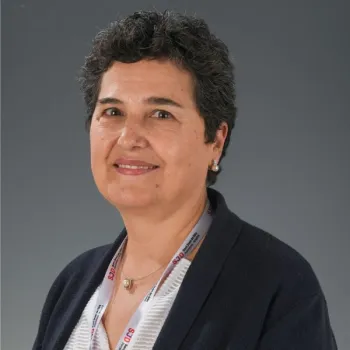
- Teresa Cusó Herreros, Nurse.
- Carmen García Rebollo, Nurse.
- Anna Maria del Castillo Aldeguer, Team administrator.
- Marta López Sanz, Secretary of the Pediatrics Unit.
International cooperation
The Infectious Diseases Unit is constantly getting involved in international collaboration projects, including:
- Twinning with Sierra Leone:
- Nutritional rehabilitation programme in the Port Loko district, focusing on acute malnutrition.
- Hospital Residency programme in partnership with the Teaching Department.
- Creation and review of pediatric healthcare protocols.
- Creation and review of infection control protocols.
- Supporting mobile clinic activity.
- Iraq and Guinea Bissau: Consulting for pediatric projects in the Doctors Without Borders programme.
- Morocco and the Ivory Coast: Training in infant health and respiratory disease with NGO Azimut.
- ICARIA Project (safety monitoring) by ISGlobal.
- HITIHE Consortium.
- Anantapur India: Supporting the Vicente Ferrer Foundation HIV Programme (2007-2023).
- Greece: pediatric devices in refugee camps on the Aegean Islands. Nutritional study (2015-2016).
Research
The SJD Research Institute (IRSJD) houses the Research Group for Infectious Diseases and the Microbiome, which focuses on the study of the clinical, molecular and epidemiological aspects of the main pediatric infectious diseases, as well as improving diagnosis thereof.
From 2015 to 2023, the Infectious Diseases Department took part in ten different competitive research projects and in over 60 clinical trials. During this period, department staff also published around 160 articles in indexed journals. At present, our team is also working on the following lines of research:
- SARS-CoV-2 infection.
- Congenital CMV infection.
- Syphilis.
- Pediatric meningitis.
- Pediatric endocarditis.
- Bacterial infection in at-risk pediatric patients.
- Antibiotic resistance.
- Tuberculosis.
- Imported diseases and international cooperation.
- Infection in cancer patients and/or hematopoietic stem cell transplant patients.
- Osteoarticular infection.
- CNS infection.
- Immunological monitoring of CMV in kidney transplant patients.
Teaching
We offer education seminars to medical students at undergraduate and postgraduate level, as well as Pediatrics and Specific Areas residents and other professionals training in pediatric infectious disease.
We have the capacity to train three department rotations simultaneously.
Teaching and training activity includes holding information seminars and sessions, protocol supervision and participating in internal and external conferences and meetings, including scientific conferences.
We would like to place particular emphasis on our Master’s programme:
Master in Infectious Diseases among Children and Adolescents
In partnership with the University of Barcelona, this Master’s programme allows students to get hands-on experience in the Infectious Diseases Department at the SJD Barcelona Children’s Hospital.
- Dr Ton Noguera is Course Coordinator, while also acting as course lecturer alongside other department staff.
- This is a practical-focused Master's with an extensive theoretical component, lasting one year and worth 60 ECTS credits.
Yearly PROA workshop for Pediatric Infectious Diseases
The Antimicrobials Optimisation Programmes (PROA) are key tools in promoting responsible antibiotic use. The PROA-SJD group aims to encourage active participation of staff in training (pediatrics, microbiology and pharmacology) so as to foster a PROA-focused approach in daily healthcare provision for our patients.
Common transversal agenda PROA-focused course for a comprehensive approach to infectious disease
This course was introduced in 2024 as a PROA-centred education intervention and was offered to professionals who have a significant impact on antibiotic use.
These staff include those involved in prescribing antibiotic medication, reviewing prescribed drugs, administering medications and treatments, obtaining and transporting biological samples, and identifying microorganisms. As such, we consider the course format as particularly important, as it involved all of these staff members (nurses, pediatricians, gynecologists, porters, pharmacists, surgeons, microbiologists, etc.).
PID Games (Paediatric Infectious Diseases Games)
This new interactive, educational development aims to broaden knowledge and increase awareness of pediatric infectious diseases. The first edition was held in Rome in 2023, and the second in Barcelona, in 2024. PID Games is a three-day course consisting of four modules on various exciting topics (for example, bacteria and antibiotics, viruses and vaccines, emerging infections and those in immunocompromised hosts). Each module includes talks given by experts from around the world, clinical cases, a debate for/against and a questionnaire for participants. The winner of these games obtains free entry to next years’ course, as well as the possibility to get involved as a junior speaker.
Furthermore, all members of the team are professors and lecturers on other Master’s programmes, courses and workshops.
